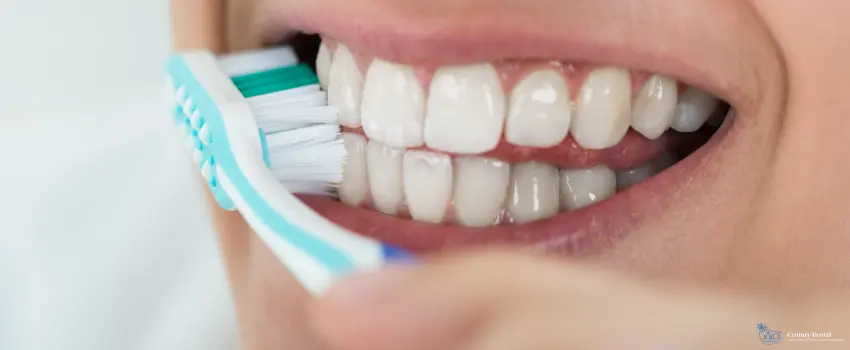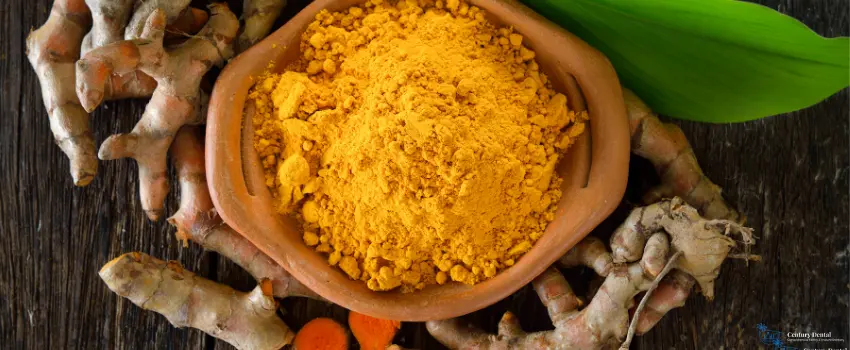Have you experienced discomfort or pain after eating ice cream or hot soup? If you have, you’re not alone. While this tooth pain doesn’t necessarily indicate a cavity, it’s also a sign of teeth sensitivity.
Also known as dentin hypersensitivity, tooth sensitivity is when the teeth respond to specific stimuli, such as hot or cold temperatures, with pain or discomfort. It may not last long or persist, affecting one or multiple teeth or all of an individual’s teeth.
Let’s learn what makes teeth sensitive, how to treat and prevent it, and some sensitive teeth home remedies to try.
Causes of Sensitive Teeth
The leading causes of sensitive teeth are tooth root exposure and worn-down enamel. These occur due to the following factors:
- Aggressive brushing – Using a hard-bristled toothbrush or brushing too aggressively wears down the tooth enamel, which exposes the sensitive dentin layer underneath. It also leads to gum recession.
- Gum disease – Tooth sensitivity happens when inflamed and sore gum tissues expose the root surface leading directly to the tooth nerve.
- Teeth whitening products – Some teeth whitening products contribute to sensitivity. Tell your dentist about your sensitive teeth when you undergo a teeth whitening procedure.
- Gum recession – Gums may recede if a person is born with thin gum tissue or develops gum disease. These can cause the gum tissue to pull away from the teeth and expose the roots.
- Cracked teeth – Bacteria and plaque can fill up a cracked or broken tooth and compromise your tooth’s enamel, leaving it vulnerable to infections and stimuli.
- Using acidic mouthwash – Some mouthwashes are too acidic and can make teeth sensitivity worse if the dentin layer of your teeth is exposed.
- Teeth grinding – Grinding or clenching teeth during stress or sleeping wears down tooth enamel and exposes the dentin underneath.
- Acidic foods – Regularly consuming acidic foods and beverages such as citrus fruits, tea, pickles, and tomatoes can cause enamel erosion.
- Age – It’s common for people between the ages of 25-30 to have sensitive teeth.
- Recent dental procedures – Dental procedures such as fillings, teeth cleanings, and dental restorations can temporarily make your teeth sensitive. It usually goes away in four to six weeks.
Sensitive Teeth: Home Remedies To Try
Here are some remedies for sensitive teeth to try at home:
Desensitizing Toothpaste
Desensitizing toothpaste is often one of the most common home remedies for sensitive teeth that are cost-effective and readily available. They have ingredients such as potassium nitrate and fluoride that protect your teeth’s nerve endings from pain, preventing pain signals from reaching your brain.
Using desensitizing toothpaste with a soft-bristled toothbrush should help with sensitivity. However, you’ll need to use it for a few weeks before you start feeling its benefits.
Saltwater Rinse
Salt is an ever-present ingredient in the home. Aside from giving flavor to your food, it’s also one of the easiest remedies for sensitive teeth.
A saltwater rinse helps alleviate pain and sensitivity. To prepare it, dissolve half a teaspoon of salt in a glass of lukewarm water. Gargle with the solution for 30 seconds to a minute, then spit it out. Repeat it twice a day.
Honey
Honey is another fantastic sensitive teeth remedy. Its healing properties help reduce pain, swelling, and inflammation. To use it, rinse your mouth with a tablespoon of honey and a glass of warm water. Use it whenever you feel discomfort.
Green Tea
There are many surprising natural remedies for treating sensitive teeth, including green tea. It’s recognized for its health benefits, such as its ability to prevent cancer and its antioxidant and anti-inflammatory properties.
You can use green tea as a mouthwash twice daily to help strengthen your teeth and alleviate tooth sensitivity.
Turmeric
Turmeric is rich in curcumin, a potent anti-inflammatory compound that makes it helpful in treating infections and inflammation that make teeth sensitive.
To reduce sensitive teeth, gently rub ground turmeric on the affected tooth and leave it in place. You can also make a homemade paste with one teaspoon of turmeric, half a teaspoon of salt, and half a teaspoon of mustard oil. Mix them thoroughly and apply the paste twice daily to your teeth and gums for the best results. However, be careful; it can stain anything.
Capsaicin
Capsaicin is a compound found in peppers that give them spiciness. It also has analgesic properties that effectively alleviate pain and inflammation associated with sensitive teeth.
You can find capsaicin as a gel or mouthwash. You’ll feel a burning sensation when you apply it to your teeth. Over time, you’ll become accustomed to it and experience pain relief.
Vanilla Extract
Vanilla is a popular dessert ingredient with pain-relieving properties; many mothers use it to treat their babies’ teething pain. To use it for sensitive teeth treatment at home, soak a cotton ball with vanilla extract and apply it to your teeth and gums for a few minutes. Repeat the process until the pain disappears.
Treatments for Sensitive Teeth
If you have tried using home remedies to treat sensitive teeth for a few weeks without improvement, it’s time to see your dentist. During the examination, the dental team will assess your symptoms and examine your teeth to determine what’s making your teeth sensitive and the best way to address it. They may also apply fluoride gels, rinses, or varnishes on the affected teeth to help alleviate discomfort or pain over regular appointments one to two weeks apart to build up protection.
It may take several appointments to relieve sensitivity. If this approach doesn’t work, the dental team may seal or fill the neck of the tooth to cover the exposed dentin. Root-filling may be necessary in severe cases.
How To Prevent Sensitive Teeth
You can prevent sensitive teeth with these steps:
- Brush your teeth at least twice daily with fluoride or toothpaste for sensitive teeth. Use a soft-bristled toothbrush, and use circular movements. Avoid brushing from side to side.
- Some foods and drinks can soften tooth enamel. Wait an hour after eating before brushing your teeth to avoid damaging teeth enamel.
- Replace your toothbrush every two to three months or when the bristles become worn.
- Ask your dental team about using a mouthguard if you grind your teeth at night.
- Limit your consumption of sugary, fizzy, and acidic foods and drinks. Consume them only during meals.
- Talk to your dentist about sensitivity before bleaching your teeth and other dental procedures.
- Visit your dentist as recommended to keep your teeth and gums healthy.
Key Takeaway
Sensitive teeth are a familiar ache people experience caused by various factors such as age, gum disease, aggressive brushing techniques, teeth grinding, and more. Fortunately, it’s easy to address. Aside from desensitizing toothpaste, some sensitive teeth home remedies to try are honey, vanilla extract, turmeric, green teeth, saltwater rinse, and capsaicin.
Say goodbye to sensitive teeth.
The best way to deal with sensitive teeth is to consult your dentist. Aside from identifying the root cause of your sensitivity, our dentist in Madeira Beach, FL, also provides preventive care services that help keep your teeth and gums healthy.
Don’t let sensitive teeth keep you from enjoying your favorite foods and drinks. Call Century Dental today.









